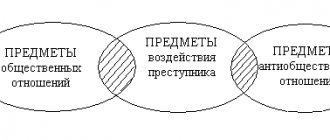The subjective side of the crime
The subjective side of the crime is the characteristics of the guilt and motive of the crime; According to Russian criminal law, without a person’s guilt, there is no corpus delicti, there can be no criminal liability and punishment.
The subjective side of a crime is the mental attitude of a person to the committed act and its consequences, in other words, it is guilt. Action or inaction is always an act of human behavior, under the control of his mind and will.
Guilt can be expressed in the form of intent or negligence.
Guilt is a person’s mental attitude towards his illegal behavior and its consequences. A necessary condition for criminal liability; expressed in forms.
Deliberate - realized (understood) the inadmissibility (illegality) of his behavior and the results associated with it and foresaw them
- Direct intent - wanted them to happen
- Indirect intent - knowingly committed
Careless - foresaw; didn't foresee it.
- Arrogance - frivolously hoping to prevent
- Negligence - should have and could have foreseen
A crime is considered committed intentionally if the person who committed it was aware of the socially dangerous nature of his action or inaction, foresaw its socially dangerous consequences and desired them or consciously allowed the occurrence of these consequences.
Irek Khabibullin beat Volodya Ivanov for allegedly being rude to him at a disco. As a result, Volodya received bodily injuries and was sick for three weeks and did not go to classes. Irek, beating Volodya, knew that he was committing an action prohibited by law, foresaw and wanted to cause harm to Volodya’s health and dignity. The investigator wrote in the decision to bring Khabibullin to criminal liability that he acted with direct intent.
A crime is considered committed through negligence if the person who committed it foresaw the possibility of socially dangerous consequences of his action or inaction, but frivolously counted on their prevention or did not foresee the possibility of such consequences, although he should have and could have foreseen them.
In the current criminal code, approximately a fifth of the articles provide for liability for careless commission of crimes. Crimes such as violations of traffic rules and operation of transport, negligence, violation of labor safety rules, careless storage of firearms and others are usually committed through negligence.
Yura and Leonid, who had recently turned sixteen, lit a fire while in the forest. It was a hot summer day. Leaving the clearing, Yura offered to put out the fire. Leonid replied that the brushwood had already burned out and it would go out on its own. Some time after they left, a wind rose, which fanned the smoldering firebrands, and a forest fire broke out from them. The boys did not foresee that a fire would break out from the extinguished fire; they did not want this. But due to their age, they should have and could have foreseen this. The guilt of Yuri and Leonid is expressed in the form of negligence.
When committing a crime, a person’s actions are determined by certain motives and are aimed at achieving certain goals. A correct assessment of any behavior is impossible without taking into account the motive and purpose. Motive and goal are mental phenomena that, together with guilt, form the subjective side of the crime .
Purpose - internal motivations of a person determined by certain needs and interests, which cause the person’s determination to commit a crime and by which he is guided when committing it, can be an aggravating or mitigating circumstance (self-interest, pity, etc.)
Motive is a mental model of the future result that a person strives to achieve when committing a crime.
An intentional crime is more dangerous than a careless one. Intentional crimes are committed seven to eight times more often than careless ones. This is evidenced by the differences in sanctions for them. For example, murder is punishable by imprisonment for up to fifteen years, and in aggravating circumstances - up to twenty years or the death penalty; causing death by negligence - imprisonment for up to three years. The danger of careless crimes should also not be underestimated. As a general rule, careless crimes are the result of frivolity, carelessness, careless handling of sources of increased danger (equipment, fire, weapons, explosives, etc.). Yes, you yourself can remember examples from literature and films when careless behavior entailed serious consequences.
Guilt is a fundamental part of the subjective side
Guilt can rightfully be considered one of the main fragments of the subjective side, but it does not limit it. The Criminal Code recognizes only the volitional and mental part of guilt, ignoring the emotional one. This can only be understood from the point of view of the difficulties of investigating and determining the real emotional state of the criminal.
Mandatory signs of the subjective side of the crime are recorded in the criminal law, Part 1, Art. 5 of the Criminal Code of the Russian Federation, which clearly indicates the indispensability of guilt in the structure of the act.
Types of motives in criminal law
All optional signs of the subjective side of the crime are no less important than guilt. Their varieties also play an important role, which show the danger of the criminal, his moral attitudes and antisocial mood. The simplest classification of motives is borrowed from the science of psychology and adapted to criminology.
- Negative motives (have an asocial connotation): selfishness, anger, self-interest, revenge, hatred, envy and many others. In many cases they serve as aggravating circumstances.
- Neutral motives: unemployment, apathy, boredom.
- Positive motives: altruism, kindness. They do not exclude criminal liability, but mitigate the punishment. An example of a specific positive motive can be given in the case of euthanasia: a nurse, wanting to relieve the pain and suffering of a patient, injects him with a substance that has a fatal effect on the body. The crime was committed, albeit with good intentions.
Presumption of innocence in criminal law
This provision is democratic, humane and legal, since a person cannot be considered a criminal until the contrary is proven. Its essence is manifested precisely in guilt, which is included in the content of the concept of “subjective side of the crime.” Motive, purpose and other factors do not play a role due to their secondary importance and complexity of qualifications.
The only independent state body that can recognize a person as a criminal is the court. The competence of other persons and structures is manifested in facilitating the collection of evidence. It is possible to prove the guilt of the subject only if there is a number of indisputable, complete, sufficient and independent evidence.
Mandatory signs of the subjective side of the crime are the first thing that needs to be examined during the case, since determining the place, time, method and other minor components without establishing guilt only leads to a delay in the criminal process. During the pre-trial investigation, it is prohibited to call the suspect a criminal. Violation of this principle is a failure to comply with the law on transparency and immediacy of judicial proceedings.
The significance of the subjective side of the crime lies in many provisions that were discussed earlier. Let's summarize them again.
- It is the subjective side of the crime that shows the psychological side of the crime, which really requires detailed research. It can also help create a psychological profile of the criminal. Very often, an accurate determination of the psychological specific character traits of the offender made it possible to assume possible post-penitentiary behavior, relapse, and correction.
- The subjective aspect of an offense is the most important part of the investigation, without which it is impossible to qualify any act as a crime. If other branches of law provide for punishment without guilt, then in criminal law this is prohibited.
- The study of the subjective element of a crime requires high competence and education from law enforcement officials. If objective aspects can be collected during the first inspection of the scene of the incident, then psychological characteristics require various interrogations, syntheses, inspections, and covert investigative actions.
The subjective side of a criminal violation is a real picture of the psychological connections of the crime. It helps to solve the internal features, reasons and conditions for committing such an act, and therefore is of great importance in the criminal process.
Forms of emotional states
In philosophy and psychology, there are 4 categories that differ in their duration and strength. These include mood, passion, affect and feeling. The latter is a form that reflects reality and expresses the individual’s subjective attitude towards satisfying his own needs, the degree of compliance of something with his perceptions. Affect is a strong but short-lived feeling. It is associated with complete immobility (stupor, numbness) or with a motor reaction. Passion is a long-lasting and strong feeling. Mood acts as a resultant category. This state is characterized by stability and duration. Mood acts as a background against which other mental processes take place. It should be noted that not all emotions are endowed with criminal legal significance and may be an element of the subjective side.
Goal as part of the subjective side
If the motive can answer the question of why a person commits a crime, then the goal answers the question of why he commits it. The subjective side of a crime is characterized by various psychological aspects, but the goal plays an important role in the study of criminal behavior and deviance.
A person sets a goal before carrying out any action, and crime is no exception. However, it should be noted that it can only exist in its intentional forms. This statement can be gleaned from logic, since negligence loses its essence when setting the goal of committing an illegal act.
The subjective side of a crime in criminal law, namely the purpose, is sometimes decisive for qualifying the article and finding the act guilty. For example, some purposes of a crime may aggravate punishment: self-interest, revenge, satisfaction of sexual needs, envy, concealing another crime or facilitating its commission.
Connection with sentencing
To choose the most appropriate and fair measure, it is first necessary to correctly qualify the violation. This is impossible without taking into account the goal and motive. Without these components, it is also impossible to properly fulfill the requirements of the principle of individualization of responsibility. Motives have a close connection with circumstances that mitigate or aggravate guilt. For example, the first include motivations inherent in actions both in necessary defense and when limits are exceeded against the background of the desire to protect personal, social, and state interests from dangerous attacks. Regardless of whether aspirations and motives are included in the structure of an illegal action as mandatory features or not, they are endowed with criminal legal significance. This is due, among other things, to the importance of these elements in the study and prevention of illegal activities.
Classification
The motive for the crime may be:
- Antisocial. In this case, we are talking about selfish-violent, selfish, violent-aggressive, political motives.
- Asocial – anarcho-individualistic, selfish, etc. These motives are considered less dangerous
- Pseudosocial. This motive for the crime is determined by the interest of a particular group, contrary to the law, personal freedom or society as a whole. It can be formed on the basis of false partnership, which leads to aggressive violent clashes, or corporatism, which results in economic violations, atrocities against the law, and so on.
- Protosocial. Its formation consists in the transition of a socially approved motive into a socially negative one. For example, violation of the law by exceeding the necessary defense, measures taken for detention, etc. Such motives include jealousy and revenge, which are formed fleetingly in conditions of conflict. They are characterized by increased affectivity.
Also, some motives are typical for intentional crimes, others - for crimes of negligence. Some may have both signs. For example, self-interest, jealousy, revenge, careerism, hooligan motives can act as motives for intentional violations. But they can also become the basis for careless actions. As for the goals, they are quite diverse. Thus, the violator may be motivated by the desire for profit, causing harm to society or an individual citizen, etc.







